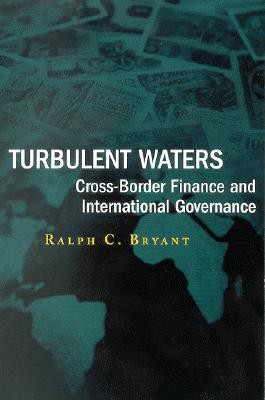
- We will send in 10–14 business days.
- Author: Ralph C Bryant
- Publisher: Brookings Institution Press
- ISBN-10: 0815700717
- ISBN-13: 9780815700715
- Format: 15.5 x 22.9 x 2.7 cm, minkšti viršeliai
- Language: English
- SAVE -10% with code: EXTRA
Reviews
Description
"
Today's world is organized politically into nation states with sovereign national governments. But as Ralph C. Bryant explains in Turbulent Waters, the world's economic structure is outgrowing its political structure. The economic links among nations have increased more rapidly than economic activity itself. As economic integration has proceeded, borders have become more porous, differences among national economies have eroded, and the policy autonomy of national governments has been undermined. Collective-governance problems increasingly spill across national borders and thus grow in importance relative to problems of domestic governance. The evolving need for international cooperation and cross-border collective governance is likely to be the single most prominent feature of world politics and economics for at least the next half century. The progressive integration of the world economy, often called ""globalization,"" has been especially dramatic for financial activity. Cross-border financial transactions facilitate saving and investment and thereby advance the well-being of individuals. But they can also generate turbulence and instability. Most individuals are unsure whether financial globalization promotes or threatens prosperity for a majority of the world's people. Bryant explains basic concepts about financial activity and collective governance, distills their international dimensions, and enables general readers to acquire a solid grasp of the key policy issues that national governments must resolve. He provides fresh insights about what is often termed the international financial architecture. But he also casts his net far wider: the book's ambitious goal is no less than to outline a pragmatically sound vision for the evolution of international governance for the world economy and financial system.
"EXTRA 10 % discount with code: EXTRA
The promotion ends in 21d.18:24:34
The discount code is valid when purchasing from 10 €. Discounts do not stack.
- Author: Ralph C Bryant
- Publisher: Brookings Institution Press
- ISBN-10: 0815700717
- ISBN-13: 9780815700715
- Format: 15.5 x 22.9 x 2.7 cm, minkšti viršeliai
- Language: English English
"
Today's world is organized politically into nation states with sovereign national governments. But as Ralph C. Bryant explains in Turbulent Waters, the world's economic structure is outgrowing its political structure. The economic links among nations have increased more rapidly than economic activity itself. As economic integration has proceeded, borders have become more porous, differences among national economies have eroded, and the policy autonomy of national governments has been undermined. Collective-governance problems increasingly spill across national borders and thus grow in importance relative to problems of domestic governance. The evolving need for international cooperation and cross-border collective governance is likely to be the single most prominent feature of world politics and economics for at least the next half century. The progressive integration of the world economy, often called ""globalization,"" has been especially dramatic for financial activity. Cross-border financial transactions facilitate saving and investment and thereby advance the well-being of individuals. But they can also generate turbulence and instability. Most individuals are unsure whether financial globalization promotes or threatens prosperity for a majority of the world's people. Bryant explains basic concepts about financial activity and collective governance, distills their international dimensions, and enables general readers to acquire a solid grasp of the key policy issues that national governments must resolve. He provides fresh insights about what is often termed the international financial architecture. But he also casts his net far wider: the book's ambitious goal is no less than to outline a pragmatically sound vision for the evolution of international governance for the world economy and financial system.
"

Reviews